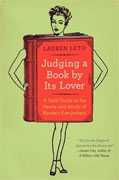Judging a Book by Its Lover
Lauren Leto
book reviews:
· general fiction
· chick lit/romance
· sci-fi/fantasy
· graphic novels
· nonfiction
· audio books
· author interviews
· children's books @
curledupkids.com
· DVD reviews @
curledupdvd.com
newsletter
win books
buy online
links
home
for authors
& publishers
for reviewers

 |
Judging a Book by Its Lover: A Field Guide to the Hearts and Minds of Readers Everywhere Lauren Leto HarperPerennial Paperback 288 pages October 2012 |
|
In Judging a Book by Its Lover
“Let me be plain when I state that my judgments, wisecracks, and sarcastic comments come from a place of deep admiration for every one of the authors whose work I discuss in these pages.”Thus, readers are forewarned not to take offense to Leto’s jokes about their favorite book or author, but the frequency of Leto’s comments about particular authors makes one wonder—all joking aside—if she truly believes her humble words. The book’s structure alternates between Leto’s personal recollections as they pertain to reading and her humorous observations about literature. Leto discusses events like her childhood and her social relationships. The pieces are relevant to the book, because she illustrates how reading is an integral part of her life and the ways it influences her social activity. The replacement of key words creatively titles sections like “The Bookshelf of the Vanities” and “Infinite Lies.” She recounts everything from misadventures at book club to her childhood spelling bee, and these recollections are skillfully woven between her literary analysis to provide a nice blend of personal anecdotes and literary knowledge. The establishment of such a background gives her credence (and seemingly carte blanche) to pursue her teasing of the literary world. The various chapters that between Leto’s personal stories are entitled things like “Rules for Public Reading” and “Ten Rules for Bookstore Hookups,” both of which include hilarious advice based upon observation of reader behavior. Leto’s chapter on “Stereotyping People by Favorite Author” lists authors and humorous accounts of who their readers are. The chapter “How to Fake It” lists authors then gives a brief summary and background information that humorously details the works enough to pretend like one has read them. The arrangement of these rules and lists leaves ample margin space in between the writing and makes Judging a Book by Its Lover Despite being humorous, the constant sarcasm becomes grating at times. While no particular fiction writer is safe from Leto’s caustic tone, “chick-lit” is a focus of vitriol and fans of this genre may be offended. The attack on the genre is an interesting detail when considered with the fact that Leto analyzes (and clearly has read) many books that are stereotypically associated with male readers. Leto frankly discusses Henry Miller, Jack Kerouac and Charles Bukowski but avoids the traditional realms of feminist criticism. Instead, she mocks them as she does everyone else, but displays a respect for their works that is lacking entirely when harshly criticizing contemporary female authors like Jodi Picoult and Jennifer Weiner. These criticisms aside, Leto evidences that reading is an experience that hinges upon individual preference. Thus, it is understood that Judging a Book by Its Lover Originally published on Curled Up With A Good Book at www.curledup.com. © Joshua Myers, 2013 |
|
|
|
 Click here to learn more about this month's sponsor! |
|
| fiction · sf/f · comic books · nonfiction · audio newsletter · free book contest · buy books online review index · links · · authors & publishers reviewers |
|
| site by ELBO Computing Resources, Inc. | |
 In her author’s note, Leto says:
In her author’s note, Leto says: